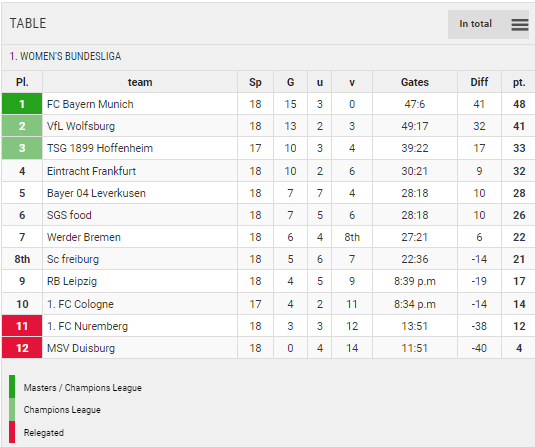For 20 years, the SGS Essen women’s soccer team has been first-class. The work of the talent factory is highly regarded throughout Germany. Now the underdog is hoping for a cup coup.
Since the men’s professional clubs have finally discovered women’s soccer, SGS Essen may feel like a relic of times gone by. Albeit an extremely innovative and successful one. Coach Markus Högner’s team is the last all-women’s club to play in the Bundesliga – and will now take on record winners VfL Wolfsburg in the DFB Cup semi-finals at their stadium. “It will be a huge challenge, but we still think we have a chance. We have to be totally courageous,” says Högner, who is highly respected in the industry.
The unusual path of the club from the Essen suburb of Schönebeck is even worth a multi-part documentary for the pay-TV channel Sky. Title: “Alone against all – SGS Essen, the talent factory of women’s soccer.” The highlight could be filmed on May 9 in Cologne at the cup final – if SGS pulls off a surprise in Wolfsburg this Saturday (1 p.m./Sky).
Essen are of course underdogs. The VfL women have won the cup nine times in a row recently, but still have to get over the bitter 0:4 against FC Bayern last weekend. Bundesliga leaders Munich and Eintracht Frankfurt will meet in the second semi-final on Sunday (3.45 pm/Sky and ARD).
Essen were cup finalists in 2014 and 2020. Most recently, Högner’s team only lost to Wolfsburg on penalties in Cologne. SGS Essen has made a name for itself above all by producing current international players such as Lena Oberdorf, Marina Hegering, Lea Schüller, Nicole Anyomi and Linda Dallmann.
The differences are getting bigger and bigger
Florian Zeutschler
In the league, Essen are once again better off than expected in sixth place. Last year, Turbine Potsdam disappeared after many titles in the 2nd division – the increasingly financially strong competition had become too overpowering for the traditional and also all-women’s club. “The differences are getting bigger and bigger,” confirmed Essen’s managing director Florian Zeutschler on Sky, describing SGS as the last club “that has no name in men’s soccer”.
Nevertheless, Essen has been first-class for 20 years – and is a training club in the very best sense. “If we work meticulously, I believe we can continue to play a role,” says Högner. The 55-year-old has been at Essen since 2010, although in between he was assistant coach of the national team and in Wolfsburg. “Our current unique selling point in the league is attracting a lot of positive attention,” explains Högner. “It is recognized everywhere that we manage to keep up at this level with our resources and even improve. This great interest naturally also helps us to develop the club further.”
Even if the SGS repeatedly has to give up top talent, such as the current Wolfsburg international striker Vivien Endemann last year, it manages to make up for this with talent from the youth department with its sports boarding school. Högner and his assistant Robert Augustin are also regarded in the industry as unusual improvers.
SGS captain Jaqueline Meißner (30) says that “no other club is able to develop young players like this”. With an average age of 23, her team is the youngest in the league. Like Lena Ostermeier, Meißner is one of the veterans of the cup semi-finalists – and not only successful in the stadium on Hafenstrasse: 27-year-old Ostermeier completed her chemistry degree at TU Dortmund University last summer and has held a doctorate since then. “It’s familiar and professional at the same time,” she says of the Bundesliga club. “You also get the freedom at SGS to build up a mainstay alongside soccer. “

